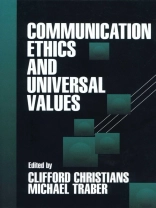This volume will revolutionize the field of communication ethics by identifying a broad-based ethical theory of communication. Returning to bedrock ethical principles found across cultures, such as justice, reciprocity, and human dignity, Communication Ethics and Universal Values transcends the world of mass media practice to uncover a more humane and responsible code of values which society as a whole can adopt and accept. The authors of Communication Ethics and Universal Values collectively approach the foundational issues of ethics from diverse perspectives and defend the possibility of universal moral imperatives. As the authors of these chapters examine the values in which their cultures are grounded, a short list of ethical principles emerges–truth, respect for another person′s dignity, and no harm to the innocent. The ethical standards that resonate within each of the six cultures represented form the common ground on which one can stand and face today′s media crises and conundrums. The study process for this book has demonstrated that cultures in all their differences reflect common humanness and humanity. By returning to established universal values, Communication Ethics and Universal Values provides communication scholars are with inspiration and direction for their ongoing work in mediation, conflict resolution, and relationship and personal communication.
Table of Content
Foreword – Seyla Benhabib
INTRODUCTION
PART ONE: FOUNDATIONS AND FRAMEWORK
The Problem of Universals in Communication Ethics – Clifford Christians
The Moral Dimension of Communicating – Antonio Pasquali
Discourse Ethics and Its Relevance for Communication and Media Ethics – Edmund Arens
Universal Values and Moral Development Theories – Deni Elliott
PART TWO: PROTONORMS ACROSS CULTURES
The Basic Norm of Truthfulness – Dietmar Mieth
Its Ethical Justification and Universality
The Arab-Islamic Heritage in Communication Ethics – Muhammad I Ayish and Haydar Badawi Sadig
Ethics and the Discourse on Ethics in Post-Colonial India – Anantha Sudhaker Babbili
Three Axiological Proposals for Communication Ethics in a Latin American Context – Gabriel Jaime Perez
Communalistic Societies – Andrew A Moemeka
Community and Self-Respect as African Values
Emergent Values from American Indian Discourse – Cynthia-Lou Coleman
PART THREE: APPLICATIONS
Communication, Hope and Ethics – Pedro Gomes
Communication Ethics in a Changing Chinese Society – Georgette Wang
The Case of Taiwan
Japanese Style Communication in a New Global Age – Hideo Takeichi
Vagaries of Time and Place – Karol Jakubowicz
Media Ethics in Poland
Accepting the Other – Keyan Tomaselli and Arnold Shepperson
On the Ethics of Intercultural Communication in Ethnographic Film
Women, Welfare and the United States Media – Robin Andersen
CONCLUSION
An Ethics of Communication Worthy of Human Beings – Michael Traber
About the author
Michael Traber, who died on 25 March 2006, was born and educated in Switzerland. In 1956 he was ordained into the Bethlehem Mission Society from where he went to the USA to study sociology and mass communication at Fordham University and New York University (1956-60). He gained his Ph D in mass communication.












